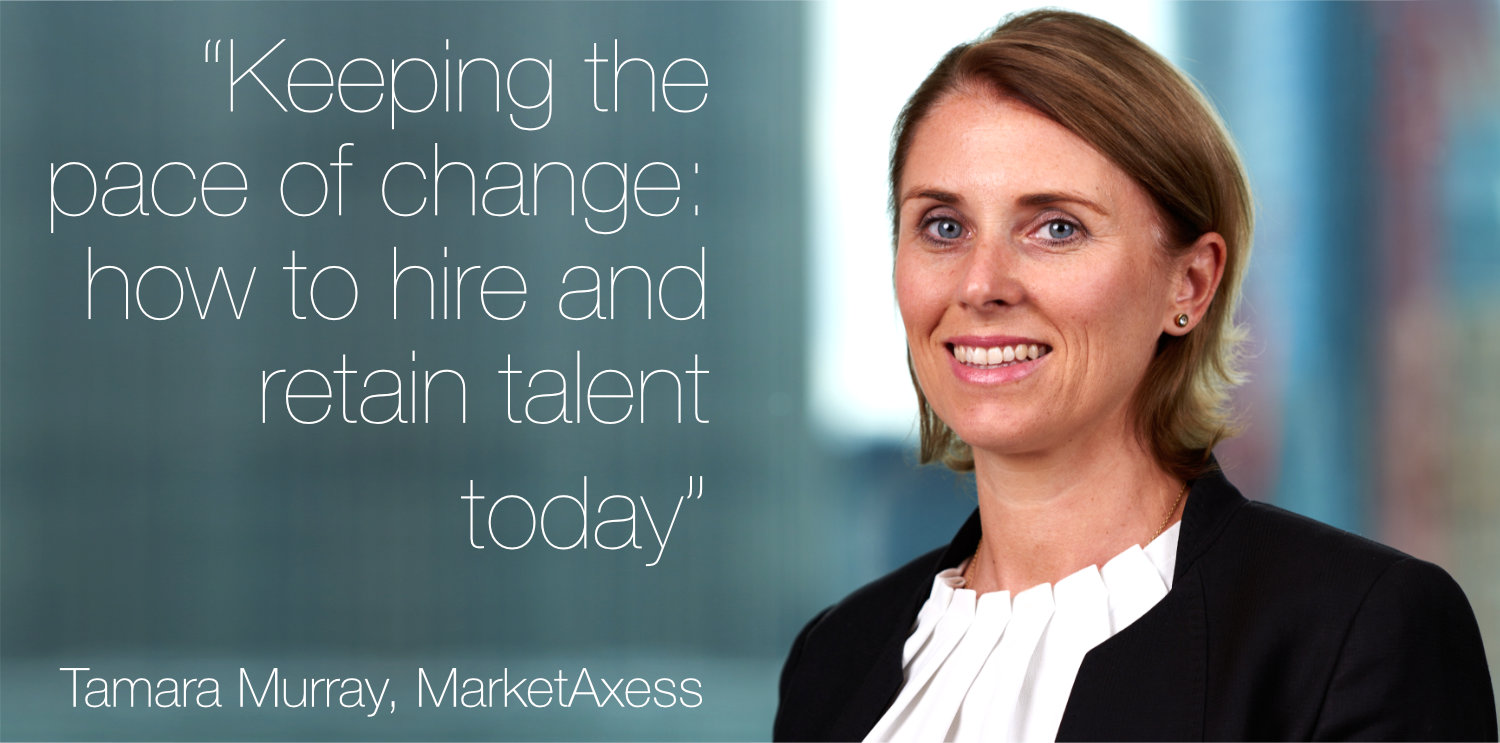
Tamara Murray, Head of HR, EMEA and APAC at MarketAxess talks to Lynn Strongin Dodds about Covid, Brexit and empowering talent.
Finding and keeping talent is never easy but particularly in technology firms where the rate of change is accelerating at lightning speed. Add in a pandemic and the UK leaving the European Union and a human resource director has their work cut out for them.
Just ask Tamara Murray, Head of HR, EMEA and APAC at MarketAxess, a leading fixed income electronic trading platform for institutional investors and dealers. “One of the biggest challenges for the organisation is to keep pace with the change in the industry,” she says. “It is moving so fast from a talent perspective, especially so with our technology teams. The question we are always asking is how can we be innovative in the digital ecosystem and what can we do to attract and retain the best in class people.”
As with many industries, there is a generational shift, particularly with millennials and Generation Z, who as Murray says, have a different mindset than their predecessors. Unlike their parents or grandparents, they can be more focused on the fast track to climbing the corporate ladder versus pursuing a longer-term approach to forging a career path.
This has meant not only increasing the time and money allocated to career development and education but also stoking enthusiasm and fostering a creative environment. “We believe in developing our own talent and have put more resources into keeping the momentum going, improving communication and investing in training,” says Murray. “We have to be proactive because we are a fintech firm in a highly competitive industry and we need to get the best from each candidate. It is important to us to build and develop junior talent as they transition throughout the organisation from their internship to their current roles.”
Murray, who works closely with the firm’s regional teams on strategic initiatives, believes that MarketAxess’ flat hierarchy is an advantage in that junior employees have easier access to senior managers. It is more difficult to raise a head above the proverbial parapet in a larger organisation that has many managerial levels. “Our structure means that you can’t just sit there and be silent,” says Murray. “Everyone has a voice and is encouraged to participate. We’re constantly striving to cultivate a workplace where all our employees feel proud of what we do and have that fire in their belly”.
While MarketAxess’ emphasis on motivation and drive permeates throughout the entire organisation, there are of course cultural nuances to the recruitment process across the geographies. Competition is intense but unsurprisingly, selecting new recruits in Europe, Middle East and Africa differs from the US and Asia Pacific. One notable variation, for example at MarketAxess, is that in the US there is a greater emphasis on direct recruitment than compared to Europe and Asia Pacific.
Murray says the company has built strong relationships with key consultants in Europe and Asia Pacific over the years to find the right talent for the company. “Asia Pacific is a competitive market for us; there isn’t necessarily a large talent pool when compared to Europe. We very much rely on our network and relationships with key recruitment consultants (who have a physical operational presence) to assist us when sourcing new talent. You generally don’t see candidates in Asia Pacific looking for roles, they would rather be approached by search consultants.”
Regardless of the region though, “hiring someone can be a lengthy process at MarketAxess,” says Murray. “It’s important that the candidate has the opportunity to get to know us and vice versa. All candidates have an HR interview and some behavioural and technical assessments. Our global employee base is over 600 staff, most know each other, and it is difficult to hide in your role, so you have to hit the ground running and make a difference quickly. We communicate this to candidates throughout the process to make sure they’re aware of our expectations.”
This year though Murray has not only been responsible for hiring new people, but also dealing with the UK leaving the European Union and ensuring that the company can maintain client coverage across Europe. Last year, the company received approval from the Dutch regulator to operate a multi-lateral trading facility (MTF) and act as a data reporting service provider in Amsterdam.
Although this year has been challenging with Covid-19 and Brexit, Murray has been able to draw on her experience as a seasoned human resource professional to help navigate these uncertain times. She started her career at Credit Suisse in 2001 as an HR Assistant before becoming a European HR business partner. Credit Suisse for Murray was a fantastic firm for someone starting out their HR career. After five years though, she felt it was time for a change.
“I liked working for a big organisation, but I was also intrigued to learn what made an organisation tick and decided I wanted to work for smaller and more innovative companies to get a different perspective,” she adds. “I also wanted to gain a better understanding of the challenges they faced, the people they wanted to hire as well as have better access to senior people, which is not always easy in a larger company.”
This led her to become Head of HR at Invista Real Estate Investment Management, which had been one of the largest UK-listed real estate fund management groups. She was responsible for building out the HR platform, as well as all people-based activity, from both an operational and strategic perspective. Murray then broadened her geographical reach by joining Actis, a pan-emerging market private equity firm, as Head of HR for UK and Asia Pacific where she was primarily in charge of all HR related matters in the UK, Asia and US.
Murray says she feels “incredibly lucky not to have encountered any issues due to her gender but that may also be because HR has possibly been perceived in the past as a female-oriented area. However, when I look back at Credit Suisse, or when I transitioned to smaller organisations, that was not the case; there were more males than females working in those companies. I also think it comes down to being resilient, courageous and focusing on where I wanted to go. I think that drive and ambition helps open doors for you.”
MarketAxess ensures that cultural awareness, diversity and inclusion is a large part of its DNA. Murray says “We recently launched a re-imagining programme focusing on Diversity, Equity and Inclusion and are encouraging all our staff to participate in an ongoing dialogue on critical topics and issues related to this effort. It’s so important for our company’s future success and hopefully we will reach a point where everyone can come to work feeling that they can be their true selves. I personally feel that as an HR leader I am in the right position to help influence and engineer that change. Having that close access to the hiring managers and key stakeholders will help us to continue to attract talent from different social economic backgrounds, ethnicities and religions.”
The company is working with an external partner, MindGym, to develop a D&I strategy, train employees and provide outlets where employees can speak out. It also recently signed up to the UN Women Empowerment Principles, a global framework designed to offer guidance on how to promote gender equality and women empowerment in the workplace.
Since Covid-19, there has also been a greater emphasis on mental health and mindfulness. “It has been a difficult year, and we have seen a significant shift in people talking openly about mental health issues and we are making sure it is top of the list in terms of how we support and work with our people.” says Murray. “We, along with other companies, are also looking at a hybrid model post Covid where people work from home and in the office. We are currently engaging with staff to seek their input. I think this flexibility will be appreciated by not only just women but by all staff whatever their situation is.”
In terms of career goals, Murray believes that while progress has been made, there are still hurdles to overcome. At a first glance, financial technology may not seem like the most welcoming industry, but Murray believes that women who want to join this sector should ignore the stereotypes often portrayed in the media.
“My advice would be to seek the perspectives of other women who are in the industry through social channels such as LinkedIn, as well as gain work experience at companies such as MarketAxess where it is easier to explore the industry in greater depth,” she adds. “A top tip is often if someone has stayed in an industry for a long period of time there is a reason. When interviewing, don’t be afraid to ask companies about their gender metrics or the interviewer, especially if a female, what attracted them to the industry and that particular company.”
©BestExecution & The DESK 2020
©Markets Media Europe 2025

























